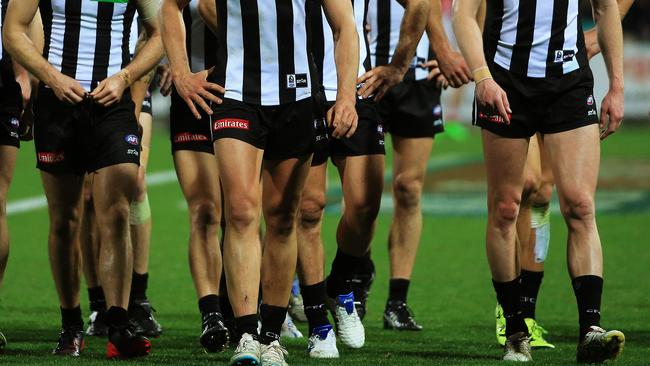AFL drugs scandal: Footy chiefs fear new policy will rub out stars
FOOTY chiefs are bracing for a spate of suspensions this season under the AFL’s revamped illicit drugs policy.

Collingwood
Don't miss out on the headlines from Collingwood. Followed categories will be added to My News.
- ROBBO: Drugs secrecy doing more harm than good
- PIES SHOCK: AFL losing fight against illicit drugs
- AFL RESPONDS: Drug tests to remain private
FOOTY chiefs are bracing for a spate of suspensions this season under the AFL’s revamped illicit drugs policy.
Players caught using drugs under the new off-season hair-testing regime — including as many as 11 from Collingwood, as revealed in the Herald Sun — will not record a strike against their name but will be target-tested.
The code adopted for 2016 will see players publicly named, shamed and banned for a month after recording a second positive test.
A third strike would mean a 12-game suspension and $10,000 fine.

The Herald Sun’s drugs revelations threw the AFL into turmoil on the opening day of the season. It did not dispute our allegations that almost a quarter of Collingwood’s playing list had been detected in the off-season hair testing.
The AFL and the AFL Players Association insisted that its new drugs policy needed time to work.
But Port Adelaide coach Ken Hinkley and former Hawthorn president Jeff Kennett called for zero tolerance.
Every player from 14 AFL clubs provided a hair sample after last year’s six-week end-of-season break. About 80 per cent from the four remaining clubs were also tested.
The results are veiled in secrecy, but the disturbing extent of drug use has caused a rift between the league’s bosses and the clubs.
Several club chiefs expressed their dismay that they were carrying the can for a policy deal between the AFL and the AFLPA.
One club executive said: “What are we trying to achieve? We’ve had a gutful of being blamed for the league’s failed policies.”
Collingwood — which will start its season against Sydney at the SCG tonight — is deeply disappointed to be singled out with its results going public amid speculation two clubs had higher readings, one double that of the Magpies.
The Magpies refused to confirm or deny that 11 players had tested positive, but AFLPA boss Paul Marsh said the figure was inaccurate.
The AFLPA refused to discuss the specifics of the drug-testing program, but pleaded for critics to give the new policy a chance.
“This is a complex issue and we are committed to giving the policy time to take effect,” Marsh said.
“It would be good if there was some respect for what we’re trying to achieve.”
AFL football operations manager Mark Evans said it was unfair to criticise the new drugs code without giving it time to bed in.
“This is the first year of the policy’s operation, and I ask that the new policy be given a chance to be in operation and measured for its impact before we demand new changes,” Evans said.
Hinkley said yesterday that he was confident his Port Adelaide list did not have a problem with illicit drugs, even though he added: “Everyone acknowledges they are an issue in the game.”
“From a personal point of view, I have always said zero tolerance. That is the way I would like it to be, but I respect what the AFL and AFLPA are trying to do,” he said.

Originally published as AFL drugs scandal: Footy chiefs fear new policy will rub out stars




